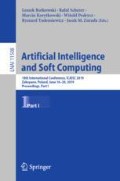Abstract
This paper describes a method of pixel-level segmentation applied to parasite detection. Parasite diseases in most cases are detected by microscopic samples examination or by ELISA blood tests. The microscopic methods are less invasive and often used in veterinary, but they need more time to prepare and visually evaluate samples. Diagnosticians search the entire sample to find parasite eggs and to classify their species. Depending on the species of the diagnosed animal, the samples can contain various types of pollution, e.g. fragments of plants. Most of the objects in the sample by their transparency look similar, and some of parasites eggs might be unintentionally omitted. The presented method based on fully convolutional network allows processing the entire space of the sample and assigning a class to each pixel of the image. Our model was trained to classify parasite eggs and distinguish them from adjacent or overlapped pollution.
Access this chapter
Tax calculation will be finalised at checkout
Purchases are for personal use only
References
Chang, O., Constante, P., Gordon, A., Singana, M.: A novel deep neural network that uses space-time features for tracking and recognizing a moving object. J. Artif. Intell. Soft Comput. Res. 7(2), 125–136 (2017)
de Souza, G.B., da Silva Santos, D.F., Pires, R.G., Marananil, A.N., Papa, J.P.: Deep features extraction for robust fingerprint spoofing attack detection. J. Artif. Intell. Soft Comput. Res. 9(1), 41–49 (2019)
Girshick, R.: Fast R-CNN. In: Proceedings of the IEEE International Conference on Computer Vision, pp. 1440–1448 (2015)
He, K., Gkioxari, G., Dollár, P., Girshick, R.: Mask R-CNN. In: Proceedings of the IEEE International Conference on Computer Vision, pp. 2961–2969 (2017)
Kamimura, R.: Supposed maximum mutual information for improving generalization and interpretation of multi-layered neural networks. J. Artif. Intell. Soft Comput. Res. 9(2), 123–147 (2019)
Kirillov, A., He, K., Girshick, R., Rother, C., Dollár, P.: Panoptic segmentation. arXiv preprint arXiv:1801.00868 (2018)
Krizhevsky, A., Sutskever, I., Hinton, G.E.: ImageNet classification with deep convolutional neural networks. In: Advances in Neural Information Processing Systems, pp. 1097–1105 (2012)
Lin, T.-Y., et al.: Microsoft COCO: common objects in context. In: Fleet, D., Pajdla, T., Schiele, B., Tuytelaars, T. (eds.) ECCV 2014. LNCS, vol. 8693, pp. 740–755. Springer, Cham (2014). https://doi.org/10.1007/978-3-319-10602-1_48
Long, J., Shelhamer, E., Darrell, T.: Fully convolutional networks for semantic segmentation. In: Proceedings of the IEEE Conference on Computer Vision and Pattern Recognition, pp. 3431–3440 (2015)
Najgebauer, P., Rutkowski, L., Scherer, R.: Interest point localization based on edge detection according to gestalt laws. In: 2017 2nd IEEE International Conference on Computational Intelligence and Applications (ICCIA), pp. 349–353, September 2017
Najgebauer, P., Rutkowski, L., Scherer, R.: Novel method for joining missing line fragments for medical image analysis. In: 2017 22nd International Conference on Methods and Models in Automation and Robotics (MMAR), pp. 861–866, August 2017
Noh, H., Hong, S., Han, B.: Learning deconvolution network for semantic segmentation. In: Proceedings of the IEEE International Conference on Computer Vision, pp. 1520–1528 (2015)
Notomista, G., Botsch, M.: A machine learning approach for the segmentation of driving maneuvers and its application in autonomous parking. J. Artif. Intell. Soft Comput. Res. 7(4), 243–255 (2017)
Pinheiro, P.O., Collobert, R., Dollár, P.: Learning to segment object candidates. In: Advances in Neural Information Processing Systems, pp. 1990–1998 (2015)
Ren, S., He, K., Girshick, R., Sun, J.: Faster R-CNN: towards real-time object detection with region proposal networks. In: Advances in Neural Information Processing Systems, pp. 91–99 (2015)
Russakovsky, O., et al.: ImageNet large scale visual recognition challenge. Int. J. Comput. Vision (IJCV) 115(3), 211–252 (2015)
Simonyan, K., Zisserman, A.: Very deep convolutional networks for large-scale image recognition. arXiv preprint arXiv:1409.1556 (2014)
Acknowledgments
This work was supported by the Polish National Science Centre under grant no. 2017/27/B/ST6/02852.
Author information
Authors and Affiliations
Corresponding author
Editor information
Editors and Affiliations
Rights and permissions
Copyright information
© 2019 Springer Nature Switzerland AG
About this paper
Cite this paper
Najgebauer, P., Grycuk, R., Rutkowski, L., Scherer, R., Siwocha, A. (2019). Microscopic Sample Segmentation by Fully Convolutional Network for Parasite Detection. In: Rutkowski, L., Scherer, R., Korytkowski, M., Pedrycz, W., Tadeusiewicz, R., Zurada, J. (eds) Artificial Intelligence and Soft Computing. ICAISC 2019. Lecture Notes in Computer Science(), vol 11508. Springer, Cham. https://doi.org/10.1007/978-3-030-20912-4_16
Download citation
DOI: https://doi.org/10.1007/978-3-030-20912-4_16
Published:
Publisher Name: Springer, Cham
Print ISBN: 978-3-030-20911-7
Online ISBN: 978-3-030-20912-4
eBook Packages: Computer ScienceComputer Science (R0)

